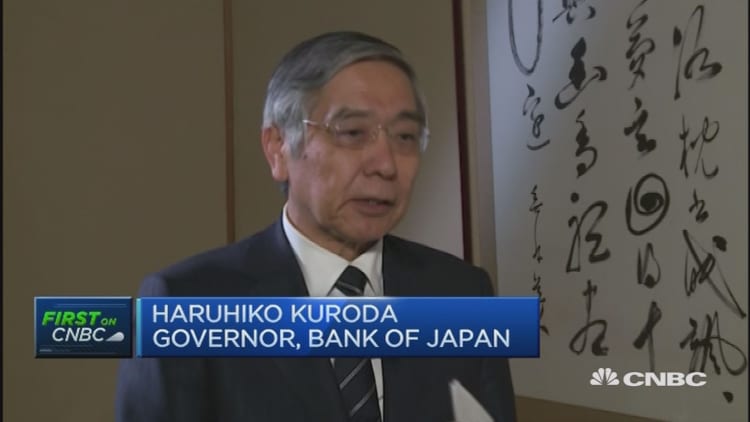
The world's third-largest economy recorded its seventh straight month of falling exports in April, official data showed on Monday, adding to the country's gloomy outlook.
Exports dropped 10.1 percent on-year in April, in line with estimates and worse than March's 6.8 percent slide, clocking up the fastest pace of decline in three months. Imports, meanwhile, tanked by an annual 23 percent, worse than Reuters poll expectations for a 19 percent drop and outstripping the previous month's 14.9 percent fall.
That left the nation with a trade surplus of 823 billion yen ($7.48 billion), below Reuters estimates for a 492.8 billion yen surplus.
The benchmark equity index opened in negative territory following the report, with the Nikkei down 1 percent in early trade, while the yen was little changed around 109.9 per dollar, near Friday's three-week low of 110.59.
Economists widely blamed an appreciating currency for April's poor performance. The yen has spiked 10 percent against the greenback since the start of the year, according to Reuters, reducing the value of repatriated earnings for export-oriented companies.
"The further strengthening of the exchange rate suggests that the drag from falling export prices should persist for now...All in all, therefore, today's figures underline that the BoJ still has more work to do to reach its 2 percent inflation target," said Marcel Thieliant, senior Japan economist at Capital Economics.
Officials were widely expected to intervene in currency markets to stem the currency's appreciation but at the Group of Seven meeting in Japan at the weekend, Washington again warned Tokyo to refrain from competitive devaluation.
"He [PM Abe] is trying to talk the G7 into coordinated action, but they won't do that so he's pretty much stuck with an economy that is middling at best. It's not the full economic recovery he talked about when taking office in 2012," Ron Napier, head of Napier Investment Advisors, told CNBC's "Squawk Box."
"Although gross domestic product (GDP) growth for Q1 was better than expected, Abe and Kuroda know pretty well that a recession is looming especially if the yen remains strong," echoed Natixis Asia economists warned in a recent note, referring to last week's data that showed real GDP recording its fastest pace of annualized quarterly growth in a year.
April's trade report also reflected soft external demand as China's economy stumbles, analysts said, pointing to the 7.6 percent fall in Japanese exports to China, Tokyo's biggest trading partner.
But HSBC warned against reading too much into that interpretation.
"It's not simply weak demand that's weighing on Asian trade, but structural, and thus far more persistent, factors. A recovery in the West, therefore, may not lift exports by as much as in previous decades. The relationship has changed," Frederic Neumann, co-head of Asian economics research at HSBC, pointed out.
"The lack of significant trade liberalization in recent years means that the benefits of earlier such rounds have been exhausted. Also, spending in the West may have shifted away from the types of goods made in Asia, for example, smartphones, to things produced locally, like smartphone apps. All this suggests that a swift export rebound isn't around the corner."


